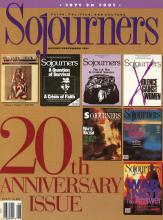With the first signs of what will surely be a larger crumbling of the Southern Baptist Convention, many questions arise concerning the institutional and programmatic future of its "moderate" wing. Prior to these questions, however, is a more profound issue.
As yet there is scant evidence that the SBC moderates are willing to grapple with an underlying theological issue: Can we honestly rest in the conviction that God and God's work will not be seriously wounded with the dissolution of the SBC's mammoth buildings and budgets? For a dozen years, the driving emotion for many moderates was the conviction that these resources must not, for God's sake, be hijacked. Now, sensing permanent institutional exile, tactics are adjusted out of frustration.
But the underlying conviction seems to have remained: God cannot use a poor church. I am convinced that this is the issue which the Spirit is putting to those now dreaming of a different future.
Is it possible that, like Abraham and Sarah, some might respond to the call to leave their own "land of Ur," the center of all the known universe -- the large, extended-family compound, where there is "much cattle and plentiful water" -- to travel out into the unknown, to "a place they knew not of"? No doubt it seemed a ridiculous, utterly irresponsible option to Abraham and Sarah's kin. It appears no less so now.
Read the Full Article
